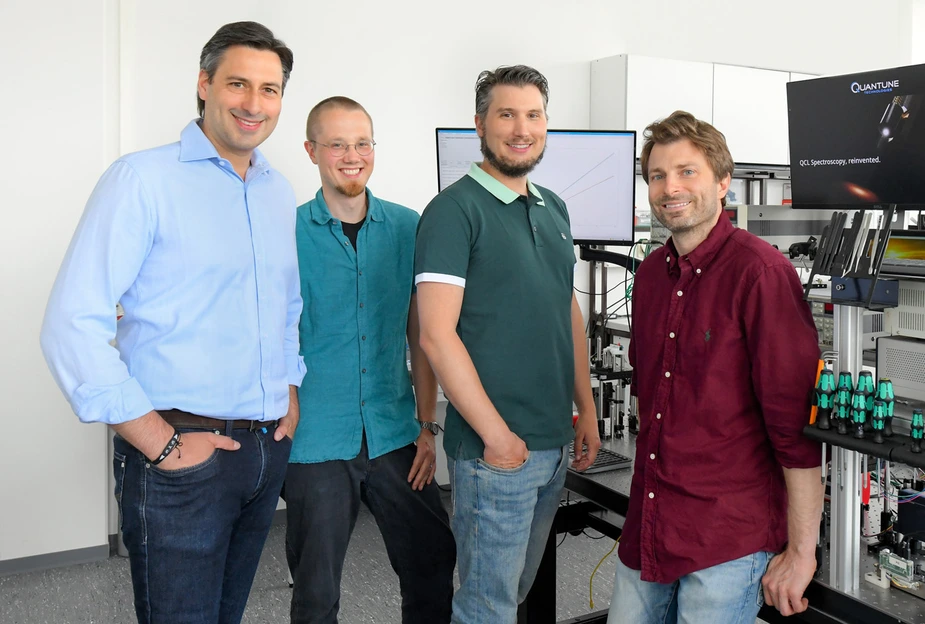Smart diagnostics
Quantune Technologies are revolutionising the use of infrared lasers
The first few years of a start-up could hardly be more adventurous: Founded with an EXIST grant straight from Berlin’s Humboldt University (HU) in October 2019, Quantune Technologies GmbH moved into its labs at Adlershof’s physics institute. Here, they set out to create a new range of spectroscopy devices: Extremely miniaturised, high-performance infrared lasers, robust and insensitive to vibrations, which can be combined with photoacoustic sensors to answer a range of analytical questions—a revolutionary technology and the company’s namesake (light particles generating sound).
In early 2020, the coronavirus pandemic made it impossible to enter the university. In just a few hours, the team surrounding Jan-Ferenc Kischkat, the managing director, and Nikolaus Hahne had to stow away the company’s entire equipment in private living rooms and cellars. Finally, a rented apartment secured the young company’s ability to continue working until they found a new and, as they say, “ideal” home at the IGZ Innovation and Start-up Centre in September 2020. The founders do not give the impression that what they experienced has slowed down their dynamism. Quite the contrary: In March 2021, they managed to raise a seven-figure capital sum from two business angel groups as well as additional funding from Investitionsbank Berlin, thereby securing product development and pilot applications for the years to come. In addition, they were able to secure one of the coveted spots at FMD Space, a high-tech incubator of Factory Microelectronics Germany, and are now receiving hands-on support from Fraunhofer-Gesellschaft and the Ferdinand Braun Institute.
The team raves about the countless uses of its miniaturised quantum cascade laser. Among other things, it is planned to use it to measure blood sugar painlessly and injury-free using fingerprints. “As a disease of civilization, Type 2 diabetes is on the rise worldwide. In most cases, it is only recognised after organ damage has already occurred. This is where we come in and provide early detection,” says Nikolaus Hahne.
Integrated into palm-sized measuring devices, smartphones, or wearables such as smartwatches, people will be able to measure glucose levels as easily as they measure their pulse rate today. Current laboratory devices that are be able to do this are large, sensitive to movement, and cost at least 30,000 euros. In the medium term, the Quantune founders set the price of their mini diagnostic device for the consumer market at a few hundred euros. It is also conceivable to measure other body parameters such as electrolyte values in dialysis patients, or the lactate concentration of competitive athletes.
“There are also numerous fields of application in the industry—like quality control— for example, when producing sugar-free foods. Or to monitor production of alcohol-free beer, when removing the alcohol following the brewing process. Using our new infrared spectrometer product range, these types of digitised industry processes (‘Industry 4.0’) can be robustly controlled,” says Jan F. Kischkat. The infrared spectrometer is capable of detecting even the minutest traces of substances and could therefore make the food industry safer.
The entrepreneur Kischkat describes himself as “home-grown in Adlershof”; he completed his diploma thesis at Humboldt-Universität and Sentech Instruments GmbH, got a PhD on laser sources in the mid-infrared range, and, in 2016, won the Adlershof Dissertation Award for it, an award given out annually by HU, the Joint Initiative of Non-University Affiliated Research Institutes in Adlershof e.V. (IGAFA), and WISTA Management GmbH. Kischkat’s idea to start a company was helped along by coaching and contacts he made during the application process for the Dissertation Award, and he ended up doing so with two fellow students, Raphael Schlesinger and Oliver Supplie, as well as Hermann von Lilienfeld-Toal, a biomedical researcher, and Nikolaus Hahne, an economist. Hahne brought with him long-standing experience in the consumer goods industry and then started again as a business angel. All of them share the desire to “do good using novel technology with great applications.” It seems like Quantune is doing exactly that: A fully functioning prototype of their development will enable initial industrial applications as early as this year.
Peggy Mory for Adlershof Journal
